Gentle Skincare Routine For Sensitive Skin – Guide And Tips
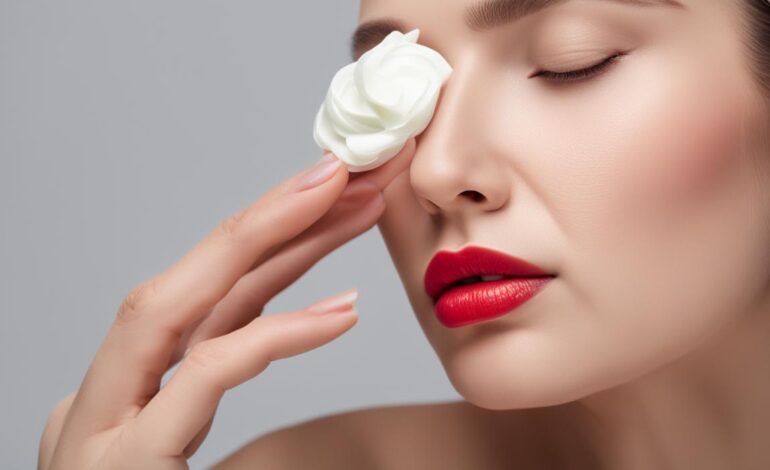
If you have sensitive skin, you know how important it is to find a skincare routine that works for you. Sensitive skin can be easily irritated, leading to redness, itching, and discomfort. But fear not! We have put together a gentle skincare routine specifically designed to soothe and nourish your sensitive skin.
Sensitive skin requires special care to maintain its health and resilience. By following a gentle skincare routine and using the best products for your skin type, you can keep your sensitive skin looking and feeling its best.
Key Takeaways:
- Choose skincare products specifically formulated for sensitive skin.
- Avoid harsh ingredients, such as fragrances and synthetic dyes.
- Take a simple approach to your skincare routine, focusing on cleansing, moisturizing, and sun protection.
- Use gentle skincare techniques, such as avoiding scrubbing and using lukewarm water.
- Consult with a dermatologist for personalized advice and recommendations.
What Causes Sensitive Skin?
Also Read : Master Your Skincare Routine For Combination Skin Today
Sensitive skin is a common condition characterized by chronic and persistent reactions to certain substances. While the exact cause of sensitive skin is still unknown, it is believed to be related to a weak skin barrier. The outermost layer of the skin, known as the stratum corneum, plays a crucial role in protecting and hydrating the deeper layers of the skin. However, individuals with sensitive skin may have a weaker skin barrier, making their skin more prone to dryness and irritation.
Also Read : Simple Skincare Routine For Dry Skin: Unveiling Radiant Beauty
When the skin barrier is compromised, irritants can easily penetrate the skin, leading to symptoms of sensitivity such as redness, itching, and stinging. Dry skin is also commonly associated with sensitive skin, as the weakened barrier struggles to retain moisture and nutrients. It is important to note that sensitive skin should be differentiated from irritated skin, which can be caused by practices like excessive exfoliation.
Also Read : Master Your Skincare Routine For Oily Skin With Our Guide
To further understand the causes of sensitive skin, it is essential to identify common irritants that can trigger reactions. These irritants can include ingredients found in skincare products, such as fragrances, preservatives, and harsh chemicals. Environmental factors like pollution, UV rays, and extreme temperatures can also contribute to skin sensitivity. Additionally, lifestyle factors like lack of sleep, stress, and poor nutrition can worsen symptoms in individuals with sensitive skin.
Also Read : Best Sunscreen For Kids: Safe & Effective Protection For Playtime!
Table: Common Causes of Sensitive Skin
| Cause | Description |
|---|---|
| Weak Skin Barrier | Individuals with sensitive skin may have a weaker skin barrier, making their skin more prone to dryness and irritation. |
| Irritants in Skincare Products | Fragrances, preservatives, and harsh chemicals found in skincare products can trigger sensitivity reactions. |
| Environmental Factors | Pollution, UV rays, extreme temperatures, and other environmental factors can contribute to skin sensitivity. |
| Lifestyle Factors | Lack of sleep, stress, and poor nutrition can worsen symptoms in individuals with sensitive skin. |
Understanding the causes of sensitive skin is crucial in managing and preventing flare-ups. By identifying and avoiding potential triggers, individuals can take proactive steps to protect and maintain the health of their skin.
Also Read : Discover The Secret To Anti Aging Skincare Today!
Signs of Sensitive Skin
Identifying the signs of sensitive skin is crucial for understanding and managing this common condition. People with sensitive skin often experience symptoms such as redness, itching, stinging, and a feeling of tightness. These reactions can occur due to various environmental factors or skincare products that the skin may be sensitive to.
Sensitive skin reacts differently to external stimuli compared to normal skin. Even mild irritants can cause an exaggerated response, leading to discomfort and visible signs of inflammation. It is essential to pay attention to these signs and seek appropriate skincare solutions that cater to sensitive skin needs.
Redness, itching, stinging, and tightness are common signs of sensitive skin. It is important to consult with a dermatologist to accurately diagnose and address your specific skin concerns.
Understanding the signs of sensitive skin can help you make informed decisions about your skincare routine and product choices. By recognizing these symptoms as indicators of skin sensitivity, you can take proactive steps to protect and nourish your skin while avoiding triggers that can lead to discomfort and irritation.

Table: Common Signs of Sensitive Skin
| Signs | Description |
|---|---|
| Redness | Visible inflammation and flushing of the skin. |
| Itching | An uncomfortable sensation that triggers the urge to scratch the skin. |
| Stinging | A tingling or burning sensation on the skin’s surface. |
| Tightness | A feeling of skin tightness or discomfort, often accompanied by dryness. |
These signs may vary in severity and can be triggered by different factors for each individual. Consulting with a dermatologist is recommended to understand your unique skin condition and develop a tailored skincare routine that addresses your specific concerns.
Understanding Your Triggers
For those with sensitive skin, identifying and managing triggers is essential for maintaining skin health. Various factors can exacerbate symptoms of sensitivity, including skincare product ingredients, environmental substances, lack of sleep, stress, and nutrition.
Skincare Product Ingredients: Many skincare products contain ingredients that can irritate sensitive skin. Common culprits include fragrances, preservatives, and certain chemical compounds. It is important to carefully read labels and look for products that are fragrance-free, hypoallergenic, and formulated for sensitive skin.
Environmental Substances: External factors in the environment can also trigger sensitivity reactions. Smoke, pollution, and harsh weather conditions can all contribute to skin irritation. Taking steps to protect your skin from these substances, such as wearing sunscreen and avoiding heavily polluted areas, can help minimize symptoms.
Lifestyle Factors: Lack of sleep, high levels of stress, and poor nutrition can all impact skin health and contribute to sensitivity. Ensuring you get enough rest, managing stress levels, and maintaining a balanced diet can help support your skin’s natural barrier function and reduce the risk of flare-ups.
| Triggers for Sensitive Skin | Examples |
|---|---|
| Skincare Product Ingredients | Fragrances, preservatives, certain chemicals |
| Environmental Substances | Smoke, pollution, harsh weather conditions |
| Lifestyle Factors | Lack of sleep, stress, poor nutrition |
“Understanding your triggers and taking steps to avoid them is crucial for managing sensitive skin. By being mindful of skincare ingredients, protecting your skin from environmental substances, and prioritizing a healthy lifestyle, you can help keep your skin calm and balanced.” – Dermatologist Dr. Emily Collins
Using Products for Sensitive Skin
When it comes to skincare products for sensitive skin, it’s important to choose options that are specifically formulated to be gentle and soothing. Look for products that are fragrance-free and hypoallergenic, as these are less likely to cause irritation or reactions. Gentle formulas are best suited for sensitive skin, as they are designed to minimize potential triggers and maintain a healthy skin barrier.
To ensure that you’re using the right products for your sensitive skin, it’s important to avoid certain ingredients that can be harsh or irritating. Stay away from skincare products that contain sodium lauryl sulfates, petrochemicals, parabens, phthalates, and synthetic dyes. These ingredients have the potential to exacerbate sensitivity and can lead to unwanted reactions.
Instead, look for products that contain calming ingredients that can help soothe and nourish your sensitive skin. Aloe vera, shea butter, coconut oil, hyaluronic acid, chamomile, sunflower seed oil, and vitamin E are all examples of ingredients that can provide relief and hydration to sensitive skin. These ingredients work to restore moisture, reduce redness, and promote a healthy complexion.
| Product Type | Description |
|---|---|
| Cleanser | A gentle cleanser that effectively removes dirt and impurities without stripping the skin of its natural oils. |
| Moisturizer | A lightweight, hydrating moisturizer that soothes and nourishes sensitive skin, providing long-lasting moisture. |
| Sunscreen | A broad-spectrum sunscreen with a high SPF that protects sensitive skin from harmful UV rays. |
Remember, everyone’s skin is different, so it’s important to find products that work well for your specific needs. It’s always a good idea to consult with a dermatologist or skincare professional who can provide personalized recommendations based on your individual skin type and concerns. With the right products and a gentle skincare routine, you can effectively care for and maintain the health of your sensitive skin.

Simplifying Your Skincare Routine
Creating a simple skincare routine is essential for those with sensitive skin. By minimizing the number of products and focusing on gentle formulations, you can help prevent irritation and maintain skin health. Here are some key steps to simplify your skincare routine:
Cleanser
Choose a gentle cleanser that is specifically formulated for sensitive skin. Look for cleansers that are fragrance-free and free from harsh ingredients such as sulfates. It’s important to cleanse your face once a day to remove dirt, oil, and impurities, but avoid over-cleansing as it can strip the skin of its natural oils.
Moisturizer
A moisturizer is a crucial step in any skincare routine, especially for sensitive skin. Look for moisturizers that are labeled as hypoallergenic and formulated for sensitive skin. These moisturizers will help replenish the skin’s moisture barrier and provide hydration without causing irritation.
SPF
Protecting your skin from the sun is essential, even for those with sensitive skin. Look for a broad-spectrum sunscreen with at least SPF 30 and apply it daily, even on cloudy days. Opt for sunscreens that are specifically formulated for sensitive skin and are free from irritating ingredients.
Avoiding the use of multiple products and sticking to a simple routine can help minimize the risk of irritation and keep your skin healthy. Remember to always patch test new products and consult with a dermatologist for personalized advice.
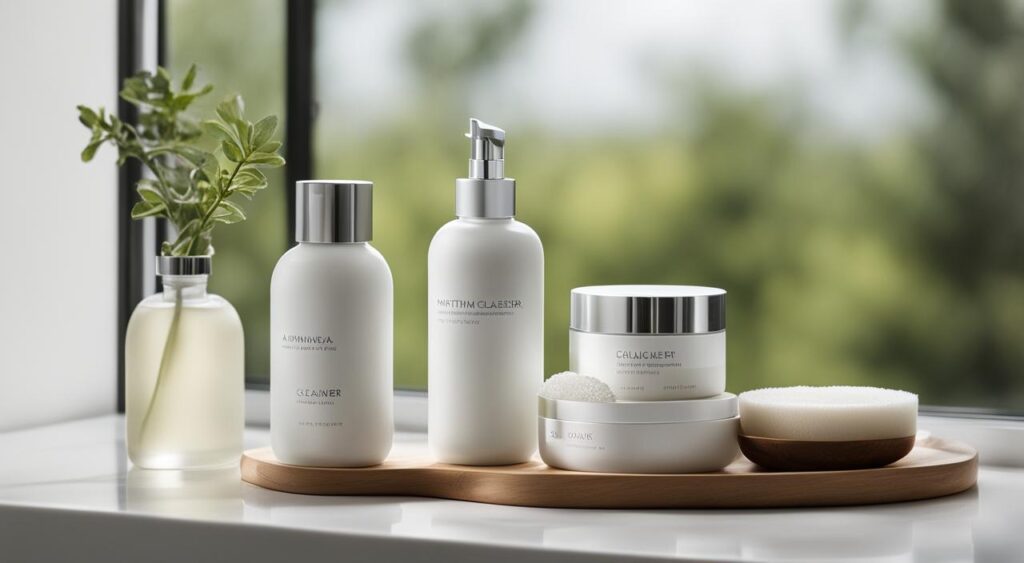
Best Practices for Introducing New Products
Introducing new skincare products to your routine can be exciting, but for those with sensitive skin, it’s important to proceed with caution. To minimize the risk of a flare-up or adverse reaction, follow these best practices:
- Perform a patch test: Before applying a new product to your entire face, perform a patch test. Apply a small amount of the product to a discreet area, such as your inner arm or behind your ear. Leave it on for 24 hours and monitor for any signs of redness, itching, or irritation. If no adverse reactions occur, you can proceed with using the product on your face.
- Gradual introduction: When incorporating a new product into your skincare routine, start by using it every few days instead of daily. This allows your skin to adjust and minimizes the risk of overwhelming your skin with multiple new ingredients. Gradually increase the frequency of use over the course of two to three weeks, monitoring your skin’s response.
Remember, everyone’s skin is unique, and what works for others may not work for you. If your skin reacts negatively to a new product, discontinue its use immediately and give your skin time to heal before introducing any other new products.
Tip: Keep a skincare diary to track the products you’ve used, how your skin reacted, and any changes you’ve noticed. This can help you identify patterns and better understand your skin’s sensitivities.
By following these best practices and taking a cautious approach, you can minimize the risk of irritation and find the best skincare products for your sensitive skin.
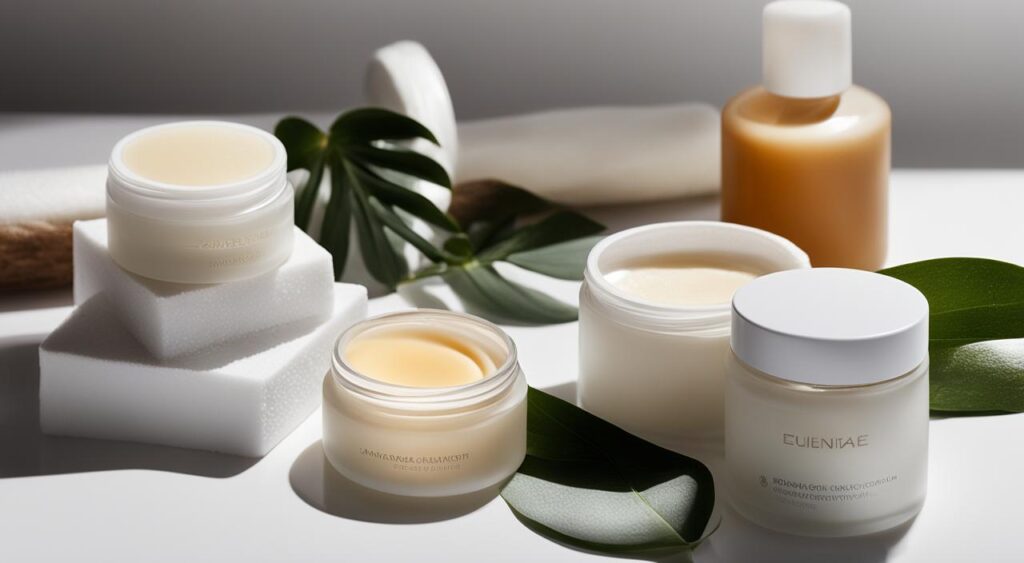
Table: Product Introduction Timeline
| Week | Product | Frequency |
|---|---|---|
| 1 | Cleanser | Every other day |
| 2 | Moisturizer | Every day |
| 3 | Serum | Every other day |
| 4 | Sunscreen | Every day |
Gentle Skincare Techniques
Gentle skincare techniques are crucial for sensitive skin. With the right approach, you can keep your skin healthy and avoid irritating flare-ups. Here are some key practices to incorporate into your skincare routine:
- Gentle Cleansing: When cleansing your face, use a gentle touch and avoid scrubbing or using firm pressure. Opt for a mild, fragrance-free cleanser specifically formulated for sensitive skin. This will help remove impurities without stripping away essential moisture.
- Gentle Exfoliation: Exfoliation is important for removing dead skin cells and promoting cell turnover. However, for sensitive skin, it’s crucial to approach exfoliation with caution. Limit exfoliation to one to two times per week and choose a chemical-based exfoliator that is gentle on the skin. Avoid harsh physical scrubs that can potentially cause irritation.
- Short Showers: When it comes to bathing, opt for short showers with lukewarm water. Hot water can strip away natural oils and further dry out the skin. Keep your showers brief and avoid using loofahs or washcloths, as they can be too abrasive for sensitive skin.
- Gentle Touch: Be mindful of how you handle your skin. Avoid rubbing or pulling on the skin, as this can cause irritation and inflammation. Instead, gently pat your skin dry with a soft towel after cleansing or showering.
By incorporating these gentle skincare techniques into your daily routine, you can help maintain the health and well-being of your sensitive skin.

Table: Comparison of Gentle Skincare Techniques
| Skincare Technique | Benefits |
|---|---|
| Gentle Cleansing | – Removes impurities without stripping moisture – Prevents irritation and dryness |
| Gentle Exfoliation | – Promotes cell turnover and renewal – Removes dead skin cells without causing irritation |
| Short Showers | – Preserves natural oils and moisture – Minimizes skin dryness |
| Gentle Touch | – Prevents skin irritation and inflammation – Maintains skin’s natural barrier |
Building a Complete Sensitive Skin Routine
A comprehensive skincare routine for sensitive skin involves various steps, including cleansing, toning, moisturizing, exfoliating, and sun protection. By following these essential steps, individuals with sensitive skin can maintain a healthy and nourished complexion. Here is a breakdown of each step:
Cleansing:
Cleansing is an important first step in any skincare routine. For sensitive skin, it is crucial to choose a gentle cleanser that effectively removes impurities without causing irritation. Look for cleansers that are specifically formulated for sensitive skin and are free of harsh ingredients such as sulfates and fragrances.
Toning:
Toning is an often overlooked but important step for sensitive skin. A gentle toner can help balance the skin’s pH levels, hydrate the skin, and prepare it for the next steps in the routine. Look for toners that are alcohol-free and contain soothing ingredients such as chamomile or rosewater.
Moisturizing:
Moisturizing is essential for maintaining hydrated and healthy skin. Choose a moisturizer specifically formulated for sensitive skin that is lightweight, non-comedogenic, and free of potential irritants. Look for moisturizers that contain ingredients like hyaluronic acid, ceramides, or glycerin to help lock in moisture.
Exfoliating:
Exfoliation helps remove dead skin cells and promote cell turnover for a brighter complexion. However, for sensitive skin, it is important to choose a gentle exfoliator that won’t cause irritation or inflammation. Opt for chemical exfoliators that contain ingredients like AHAs or BHAs, which are milder than physical scrubs or brushes.
Sun Protection:
Sun protection is crucial for all skin types, especially for sensitive skin that can be more prone to sunburn and damage. Use a broad-spectrum sunscreen with an SPF of 30 or higher and apply it generously to all exposed areas of the skin. Reapply every two hours, and seek shade during peak sun hours to further protect your skin.
| Step | Product Recommendations |
|---|---|
| Cleansing | Gentle Cleanser for Sensitive Skin |
| Toning | Alcohol-Free Toner with Soothing Ingredients |
| Moisturizing | Lightweight Moisturizer for Sensitive Skin |
| Exfoliating | Chemical Exfoliator with AHAs or BHAs |
| Sun Protection | Broad-Spectrum Sunscreen with SPF 30+ |
By following a complete skincare routine tailored to sensitive skin, individuals can effectively manage their skin’s needs and maintain a healthy, radiant complexion. Remember to choose products that are specifically formulated for sensitive skin, and always patch test new products before incorporating them into your routine. Consulting with a dermatologist can also provide personalized advice and recommendations for your specific skincare concerns.
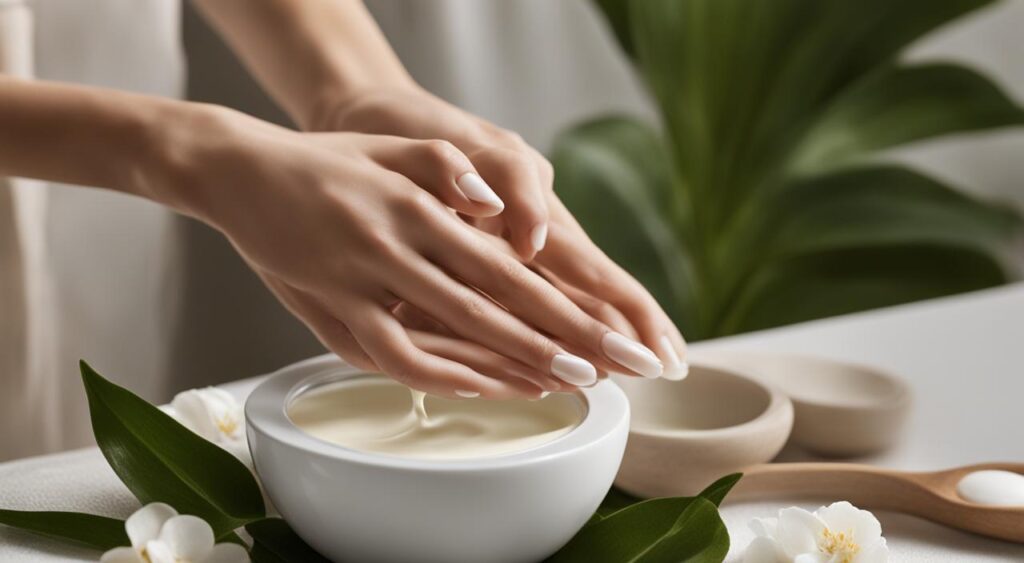
Soothing Masks and Anti-Aging Treatments
When it comes to caring for sensitive skin, incorporating soothing masks into your skincare routine can provide much-needed relief. These masks are specifically formulated to calm and hydrate sensitive skin, helping to reduce redness and irritation. By using a soothing mask once a week, you can give your skin a nourishing boost and promote a healthier complexion.
Look for facial masks that contain gentle and calming ingredients such as aloe vera, chamomile, oatmeal, or cucumber extract. These natural ingredients have anti-inflammatory properties that can help soothe sensitive skin and reduce redness. Apply the mask evenly onto clean skin, leave it on for the recommended time, and then rinse it off with lukewarm water. Remember to follow up with a moisturizer to lock in the hydration.
While sensitive skin requires gentle care, it’s still important to address the signs of aging. Thankfully, there are anti-aging treatments available that are suitable for sensitive skin. When choosing anti-aging products, opt for those that are fragrance-free, hypoallergenic, and specifically formulated for sensitive skin.
Consult with a dermatologist to find the right anti-aging treatments for your specific needs. They can recommend ingredients such as hyaluronic acid, which helps to hydrate and plump the skin, and niacinamide, which can improve the appearance of fine lines and wrinkles. Always perform a patch test before incorporating any new anti-aging products into your routine to ensure they are well-tolerated by your sensitive skin.
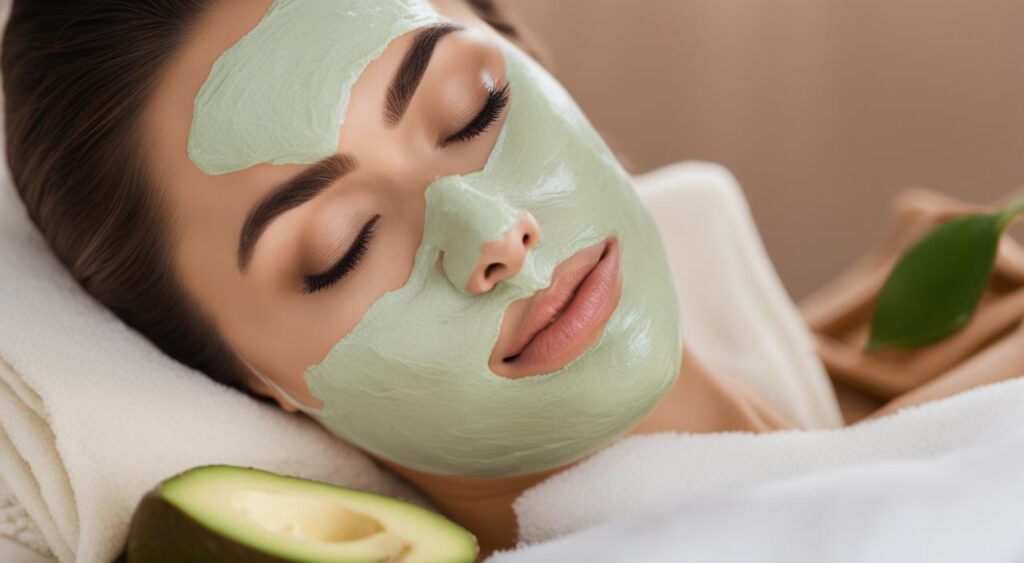
Remember, a comprehensive skincare routine for sensitive skin should be based on your individual needs and preferences. What works for one person may not work for another, so it’s essential to listen to your skin and make adjustments as needed. By being mindful of the products you use and incorporating soothing masks and anti-aging treatments into your routine, you can keep your sensitive skin looking and feeling its best.
The Importance of Serums
Serums are a crucial component of a skincare routine for sensitive skin. With their lightweight and concentrated formulas, serums can effectively target specific concerns and provide nourishment to the skin. When choosing a serum for sensitive skin, it is important to look for ingredients that are gentle and beneficial for the specific concerns you want to address.
Hyaluronic acid is a popular ingredient in serums for sensitive skin. It is known for its ability to deeply hydrate the skin and retain moisture, helping to improve skin barrier function and reduce dryness. Niacinamide is another valuable ingredient for sensitive skin, as it has anti-inflammatory properties that can help reduce redness and irritation.
Specific Concerns
When choosing a serum, it is important to consider your specific concerns and desired outcomes. If you’re looking to reduce the appearance of wrinkles and fine lines, opt for a serum that contains ingredients like peptides or retinol. For those wishing to fade dark spots or even out skin tone, serums with ingredients like vitamin C or kojic acid can be beneficial.
| Concern | Serum Ingredients |
|---|---|
| Wrinkles and Fine Lines | Peptides, Retinol, Vitamin A |
| Dark Spots and Uneven Skin Tone | Vitamin C, Kojic Acid, Licorice Extract |
Remember to always patch test new serums before incorporating them into your routine and introduce them gradually to minimize the risk of irritation. Additionally, consulting with a dermatologist can help you determine the best serums for your specific skin concerns and sensitivity levels.
Also Read : Master Your Skincare Routine For Oily Skin With Our Guide
Conclusion
In conclusion, taking care of sensitive skin requires a gentle and mindful approach to skincare. By understanding the causes of sensitive skin and identifying your triggers, you can make informed decisions about the products you use. Opt for fragrance-free, hypoallergenic, and gentle formulas that are specifically designed for sensitive skin. Look for ingredients like aloe vera, shea butter, and chamomile, which can help soothe and calm sensitive skin.
In addition to product selection, practicing gentle skincare techniques is crucial. Avoid over-exfoliating and opt for chemical-based exfoliators instead of physical scrubs. Use a gentle touch when cleansing and avoid harsh scrubbing or rubbing. Take short, lukewarm showers to protect the skin barrier and pat the skin dry with a soft towel.
By following these tips and seeking personalized advice from a dermatologist, you can create an effective skincare routine for your sensitive skin. Remember to perform patch tests when introducing new products and go slow to minimize the risk of flare-ups. With proper care and attention, you can maintain healthy and glowing skin, even with sensitivity.
FAQs
Q: What is a gentle skincare routine for sensitive skin?
A: A gentle skincare routine for sensitive skin involves using mild, non-irritating products that help to soothe and protect delicate skin.
Q: How important is sunscreen in a skincare routine for sensitive skin?
A: Sunscreen is crucial for sensitive skin as it helps to protect the skin from UV damage, which can trigger sensitivity and irritation.
Q: What are the best skincare products for sensitive skin?
A: The best skincare products for sensitive skin are those that are fragrance-free, alcohol-free, and formulated with gentle, soothing ingredients such as aloe vera and chamomile.
Q: How can I determine if I have sensitive skin?
A: You can determine if you have sensitive skin by understanding whether your skin is prone to redness, irritation, or reacts adversely to certain skincare products or environmental factors.
Q: What role does toner play in a skincare routine for sensitive skin?
A: Toner in a skincare routine for sensitive skin helps to balance the skin’s pH levels and remove any remaining traces of makeup or impurities without stripping the skin. Look for alcohol-free toners.
Q: Why is eye cream important in a skincare routine for sensitive skin?
A: Eye cream is important in a skincare routine for sensitive skin as the delicate skin around the eyes is more prone to dryness and irritation, and requires special attention and hydration.
Q: What are the key considerations in putting together a skincare routine for sensitive skin?
A: When putting together a skincare routine for sensitive skin, it’s important to use gentle skincare products that won’t strip the skin, provide adequate hydration, and avoid harsh ingredients that may trigger sensitivity.
Q: How do I know if a skincare product is suitable for sensitive skin?
A: Look for skincare products that are labeled as suitable for sensitive skin, fragrance-free, hypoallergenic, and formulated with gentle, non-irritating ingredients.
Q: What role does a facial cleanser play in a gentle skincare routine for sensitive skin?
A: A facial cleanser in a gentle skincare routine for sensitive skin helps to remove impurities and makeup without leaving the skin feeling stripped or dry, thus maintaining the skin’s natural moisture barrier.
Q: What is the best way to care for stressed and reactive sensitive skin?
A: The best way to care for stressed and reactive sensitive skin is to use gentle, calming skincare products that help to soothe and rebalance the skin, such as products containing ingredients like madecassoside or vitamin B5.
